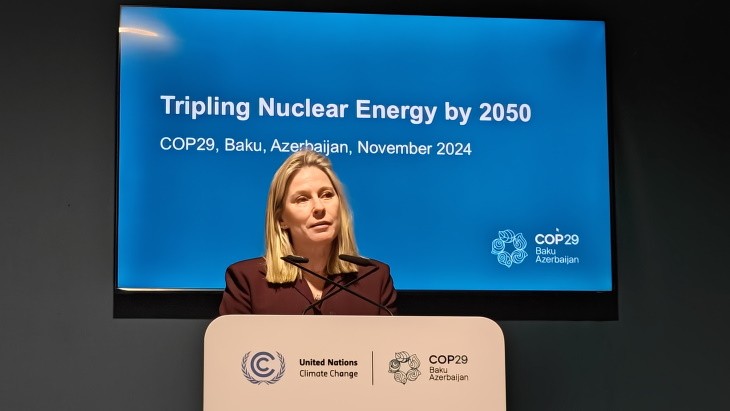At the ongoing COP29 UN Climate Change Conference in Baku, Azerbaijan, six additional countries have joined a global declaration aimed at tripling nuclear energy capacity by 2050. The announcement, made on the third day of the World Climate Action Summit, signals growing international support for nuclear energy as a critical component in achieving climate goals and securing energy sustainability.
The event was co-organized by the COP29 Presidency, the International Atomic Energy Agency (IAEA), the United States, and the World Nuclear Association. It marks a significant moment in global climate discussions, bringing the total number of countries endorsing the declaration to 31.
Dr. Sama Bilbao y León, Director General of the World Nuclear Association, expressed her enthusiasm for the expanded coalition, stating: “We warmly welcome these six new countries to the Coalition of the Ambitious. Today’s announcement highlights the essential role of nuclear energy in meeting the Paris Agreement goals in a cost-effective and equitable manner.”
Nuclear energy, which has long been recognized for its potential to provide a reliable, low-carbon power source, has become an increasingly attractive solution in the fight against climate change. Dr. Bilbao y León emphasized that the global commitment to nuclear energy is not just about immediate action but also long-term energy security. “The signatories to this declaration are making a long-term commitment. But it is a long-term commitment with a long-term payoff, providing energy certainty and reliability in an uncertain world.”
The declaration reflects the growing recognition of nuclear energy as a key player in global efforts to reduce carbon emissions and transition to a net-zero economy. Nuclear energy is seen as crucial for meeting the ambitious targets set by the Paris Agreement, offering a reliable and scalable solution to complement intermittent renewable energy sources such as wind and solar power.
The announcement comes on the heels of other significant developments at COP29, including the release of a roadmap by the U.S. Administration outlining plans to deploy 200 gigawatts (GW) of nuclear capacity by 2050. This initiative aligns with the broader push to scale up nuclear energy worldwide as part of efforts to address climate change and meet growing energy demands.
Dr. Bilbao y León also highlighted the growing support for nuclear energy from a diverse range of stakeholders, including major global banks, advanced technology companies, and the public. She noted that nuclear energy has attracted significant interest and investment, with a broad coalition rallying behind its potential to meet the world’s future energy needs. “Nuclear can now count on the world’s biggest banks to back the growth of the nuclear industry. Nuclear has attracted the interest and investment of the world’s largest and most advanced technology companies,” she said.
As countries work toward achieving net-zero emissions by mid-century, nuclear energy is increasingly seen as a critical tool for reducing carbon footprints while ensuring a reliable and affordable energy supply. The continued expansion of the Coalition of the Ambitious is a clear indication that nuclear energy will play a pivotal role in shaping the global energy landscape in the coming decades.
The six new countries joining the declaration bring fresh momentum to the growing movement in favor of nuclear energy, reinforcing the belief that nuclear power is an essential part of the solution to climate change, energy security, and sustainable development. With continued support from governments, industry, and financial institutions, nuclear energy is poised to become a cornerstone of the global energy transition.
This announcement further cements nuclear energy’s place in the broader conversation about how to combat climate change while meeting the world’s growing energy demands in a sustainable way. As nations across the globe intensify efforts to reduce emissions and accelerate the clean energy transition, nuclear energy stands as a crucial ally in the battle for a sustainable and low-carbon future.
